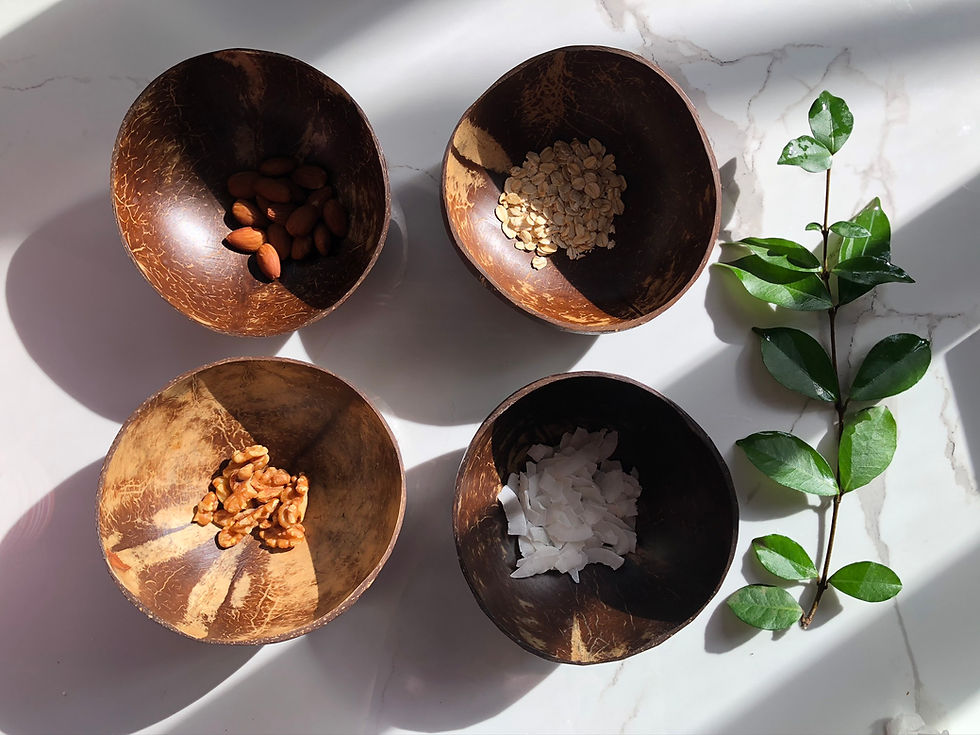Rethink Your Homeware Choices
- Lisa @ Mei & Co.

- Jul 29, 2020
- 3 min read
Getting involved in sustainable living is getting easier. As designers are onboard to make our earth a better place, many homeware products are now made from sustainable materials.
If you wish to play a part in reducing the use of earth’s natural resources to help preserve the environment, why not consider homeware made from sustainable materials when you make your next homeware purchase?

Coconut Bowls https://www.meico.com.au/product-page/coconut-bowls
What materials are considered sustainable materials?
Materials from mother nature, or materials that can be recycled, compostable or biodegradable are sustainable.
Stainless Steels
Stainless steel is one of the most environmentally friendly materials on earth.
It is extremely durable and corrosion resistant. It is 100% recyclable, due to its high recycled content. There are no toxic materials in stainless steel, therefore, it does not produce toxic run-off during the recycle process, so its impact on the environment is minimal.
When recycled, it does not reduce in quality, which makes it an ever-lasting material when the recycle process goes on indefinitely. Stainless Steel is non-degradable.
Containers made from Stainless steel keep food for longer and in better quality compared to plastic containers. Stainless steel does not absorb food odour and is not stained by certain food ingredients like plastic does. They are also easier to clean and more hygienic. Due to its durability, it has a much longer long span than plastic containers do.

Stainless Steel Snack Box https://www.meico.com.au/product-page/stainless-steel-lunch-box-with-bamboo-lid
Acacia Wood
Acacia trees are fast growing and low maintenance, the durability of the wood is long lasting which makes them a sustainable wood. The wood is lightweight, scratch, and water resistant. Its natural antibacterial property makes it an eco-friendly material for preparing or serving food. Utensils and serving plates made from Acacia wood are good alternatives to plastic.

Acacia Wooden Plates https://www.meico.com.au/product-page/acacia-wooden-plate-set-3-pieces
Bamboo
Bamboo is one of nature’s most sustainable resources; it is 100% biodegradable.
Bamboo is a super plant. It gets the badge ‘the world’s most renewable material’ for many reasons. It is the fastest-growing plant in the world. It can grow up to 1 meter in one day, absorbs five times more carbon dioxide and produces 35% more oxygen trees.
Bamboo can thrive without pesticides and little water, which is completely opposite to cotton crops. When bamboo is harvested, the plant regenerates itself quickly. Bamboo also has erosion control and soil nourishing qualities as they bind the soil firmly to prevent soil loss from ravines.
Bamboo can be used in different forms to make homeware. Some common examples are toothbrushes, soap holders and containers.
Bamboo Fabric is created by crushing the bamboo plant and then break the bamboo walls into a pulp with the help of natural enzymes. The natural bamboo fibres are mechanically combed out and spun into yarn by undergoing various processes.
Bamboo fabric is naturally antimicrobial, hypoallergenic and thermal regulating. It is also resistant to mould. Bamboo is super absorbent due to its porous nature. The super plant’s fibre is extra soft with a silky cashmere feel. Bamboo fabric is commonly used to produce towels, baby swaddles, and clothing.

Bamboo Containers for anything https://www.meico.com.au/product-page/bamboo-container-for-condiments
Ramie
Ramie is another highly sustainable eco-friendly fibre that does not require the use of any pesticides or chemicals to grow and can be harvested up to 6 times in a successful year! It is very strong and durable, 8 times stronger than cotton and even stronger when wet.
Ramie are commonly made into fabrics for household furnishings and clothing. Since Ramie is naturally resistant to bacteria and mould, we used ramie to make a body puff to replace the nylon puff in the market. https://www.meico.com.au/product-page/eco-body-puff
There are many other sustainable materials around us. They include aluminium, commonly used to make lunch boxes and bottles, Loofah to make kitchen and body sponges, Coconut Shell for bowls and Coconut husk for scrubs, corn for toothbrushes and floss and jute for shopping bags.
If you look around, there are many options for us to take part in a sustainable lifestyle. Next time you make a purchase for your home, keep these materials in mind. 😊




Comments